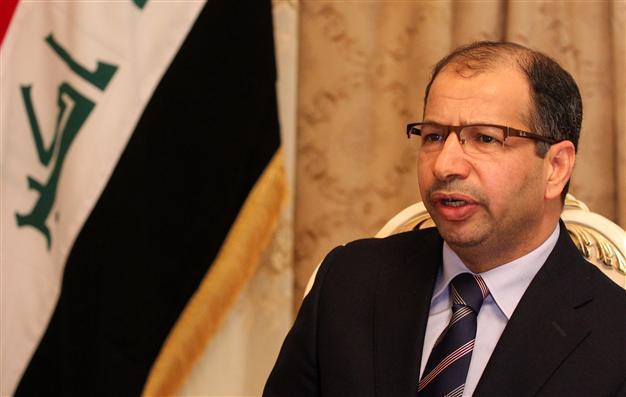Iraq speaker says Anbar operation not well prepared
BAGHDAD - Agence France-Presse

Salim al-Juburi, the Iraqi Parliament's speaker, speaks to an AFP reporter during an interview in Baghdad on May 27, 2015. The operation by Iraqi government and allied forces to liberate Anbar and its capital Ramadi from ISIL was launched too soon, Parliament Speaker Salim al-Juburi said. AFP Photo
The operation by Iraqi government and allied forces to liberate Anbar and its capital Ramadi from the Islamic State of Iraq and the Levant (ISIL) was launched too soon, Parliament Speaker Salim al-Juburi said May 27."Zero hour was announced but this important battle should have been better prepared, especially because Anbar is a bastion," he told AFP in an interview.
Regular forces and Hashed al-Shaabi paramilitaries have launched an operation aimed at severing ISIL supply lines in Anbar and are closing in on Ramadi.
The battle to wrest back the provincial capital the jihadists captured on May 17 in a deadly three-day blitz has not begun in earnest however, with government forces positioning themselves around the city for the time being.
The jihadists also control most other parts of Anbar.
"If victory is achieved against Daesh there, it will prepare the ground for the larger battle in Nineveh," said Juburi, using an Arabic acronym for ISIL.
The northwestern province of Nineveh is ISIL's other main stronghold in Iraq. Its capital Mosul is Iraq's second city and still holds a large civilian population.
"But it was understood after the fact that the desired level of preparedness was not reached," Juburi said.
He said the Sunni tribal fighters who had at least partially been holding off ISIL in Ramadi for months until two weeks ago need much more support and weapons.
"We have to focus on this point in our battle against Daesh [ISIL], which is described as a Sunni group," said the 43-year-old president of the council of representatives, himself a Sunni.
"Whoever confronts it must also be from the Sunni community, after being given support, and should not be second fiddle."
Prime Minister Haider al-Abadi had opposed deploying Shiite militias to Anbar, a Sunni stronghold, but the poor performance of the regular forces during the fall of Ramadi left him with few options.
With US support, he had started training and incorporating Sunni tribal fighters into the Hashed al-Shaabi, a solution seen as more palatable to Anbar's Sunni population.
The organisation is an umbrella for Shiite militias and volunteers which Abadi wanted to turn into a more cross-sectarian force and a precursor of a National Guard.
















